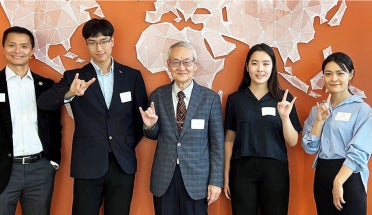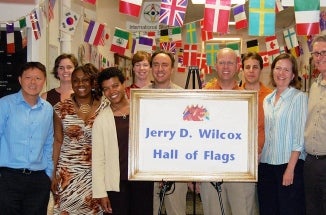
A Lifelong Champion of International Education
- Mar 26, 2025
- Global Alumni Relations
- by Ellen Stader
Departing originally from the landlocked plains of Iowa, Jerry Wilcox traveled overseas and back many times, taking a circuitous route to build what would become a storied career in international education.
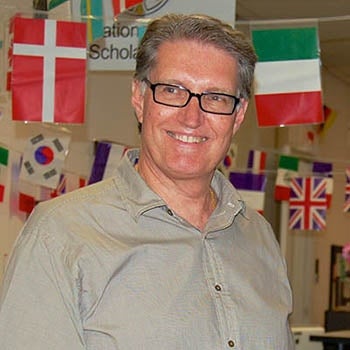
After a high school friendship with a Japanese exchange student piqued his interest in life outside the United States, Wilcox first enrolled at Iowa State University, then left after just one year to seek a different kind of education abroad — on the factory floors of Stuttgart, Germany, accompanied by three companions. These experiences, he said, foreshadowed his lifelong passion for cross-cultural exchange.
“I’ve always been interested in intercultural training,” Wilcox reflected.
This interest would guide his path through international student services and higher education for the next several decades, eventually landing him in the director position at the International Office of The University of Texas at Austin. Even after retirement, Wilcox’s legacy would endure with a scholarship for international Longhorns.
From Peace Corps to Ivy League
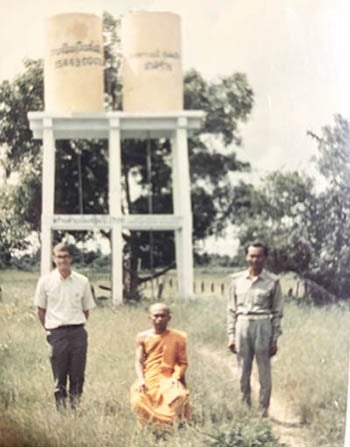
After returning from Germany, Wilcox completed his undergraduate degree at Iowa State and subsequently joined the Peace Corps. He spent the next two years in Thailand, constructing water towers for rural schools in the agricultural province of Nakhon Sawan.
Upon his return from Peace Corps service, he undertook a fellowship at the University of Hawaii’s East-West Center, where he met the woman who would become his wife for nearly 55 years (and counting). Rosalie Cristeda Forminia Duldulao Lucas was earning her master’s degree in library science.
“She and her family accepted such a grand level of my cultural incompetence over the decades that I learned of the high level of tolerance necessary for delving into the field of international educational exchange,” said Wilcox of their meeting and marriage.
Shortly after encountering the love of his life, Wilcox next found his true professional calling in 1971 at Cornell University. After initially managing the International Living Center there, he soon transitioned into the role of foreign student advisor, eventually rising to become the director of the International Students and Scholars Office.
Along the way, he became deeply involved in international admissions and eventually credential evaluation, working to assess academic records from the Philippines. These experiences steeped Wilcox in the complexities of global academic standards and admissions, further shaping his expertise in international education.
Leading UT’s International Office
In September 1998, after 27 years at Cornell, Wilcox took on a new challenge: moving from Ithaca, New York, to Austin, Texas, to become the director of the International Office at UT Austin. He held this position until his retirement in August 2008.
Unlike many institutions where English as a Second Language, study abroad and international student services were separate entities, UT Austin maintained all three units within the same organization — a structural advantage Wilcox had long wished to implement at Cornell.
His tenure at UT coincided with a period of significant globalization in higher education, and he worked at the forefront of efforts to ensure that UT Austin became and remained a welcoming environment for students from around the world.
“Jerry Wilcox’s combination of experience, leadership, humanity and diplomacy set the bar for international education leadership,” said Michael Smith, director of the English Language Center. “His mentorship profoundly shaped my career, and I was so fortunate to work with him for many years.”
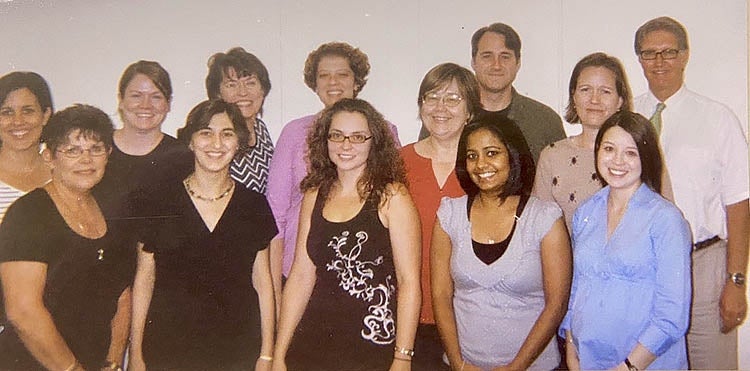
Under Wilcox’s leadership, the International Office (which was rebranded as Texas Global in 2019) grew in both scope and impact, expanding services for the University’s international students and scholars. He and his team found creative solutions, working also to expand and support growth in Education Abroad and the English Language Center. The effect was inspiring.
“Though many of us in the International Office were just starting our careers in international education when Jerry arrived, he treated us as equals and provided the example, support and encouragement necessary to help us accomplish much more across our individual units than we would have achieved on our own," said Smith.
Wilcox set about unifying the office’s staff and structure. Recognizing the importance of collaboration, he worked to break down isolation between departments, instituting periodic meetings and retreats that emphasized intercultural training and staff mobility between units.
“Bringing the staff together from their silos with cross-unit collaboration was an enormous accomplishment, one that continues today,” said Darcy McGillicuddy, current director of Marketing and Communications at Texas Global. “We work as one team, with one purpose. This is Jerry’s legacy.”
Sustaining a Legacy of Commitment
Wilcox’s passion for international education began in his youth when he befriended the aforementioned Japanese student, the first exchange student at his small high school in southwest Iowa. Decades later, while on a Fulbright grant in Japan, Wilcox reconnected with this friend, who had become a doctor in Hokkaido. This full-circle experience reinforced Wilcox’s belief in the life-changing power of international exchange.
“I have to say, I’m a real softy for International Student and Scholar Services and their work,” Wilcox said.
He has maintained his transnational legacy every year since 2003 with contributions to a scholarship endowment for international students on the Forty Acres. The scholarship helps international students overcome financial barriers, allowing more students to benefit from the kind of global experiences that shaped Wilcox’s life and work.
"The Jerry D. Wilcox Community Engagement Scholarship has been instrumental in supporting international students at UT Austin for more than two decades,” said Fiona Mazurenko, director of Global Initiatives and Alumni Relations at Texas Global. “It has provided essential aid and fostered a sense of belonging and community, empowering students to excel both academically and personally.”
This annual scholarship contributes $3,500 toward tuition for an undergraduate student who demonstrates leadership and academic achievement; participates in campus and community organizations, particularly in leadership roles; and makes positive contributions to the campus community.
“International students are essential to the vibrancy and innovation of U.S. universities, enriching the academic experience for the entire campus community,” said Mazurenko. “The generosity of donors like Jerry Wilcox plays a crucial role in ensuring that students from all backgrounds have the opportunity to contribute to UT Austin and achieve their goals."
National Leadership and Advocacy
Beyond his giving and work for UT Austin, Wilcox also made substantial contributions to the work of global education at the national level. In the process, he helped propel UT to the top of the field.
“Jerry was very well respected and well known across the United States as a leader in international education,” recalled Teri Albrecht, now assistant vice provost for operations and chief of staff at Texas Global. “UT was also well respected, but Jerry elevated our visibility even further by encouraging us to contribute widely to the field.”
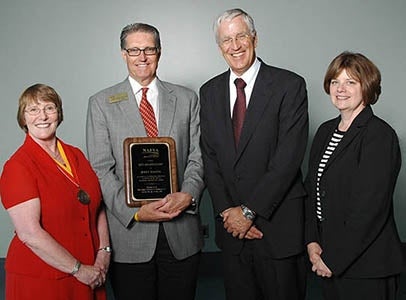
Upon his arrival at UT, Wilcox was already established in the Association of International Education Administrators (AIEA). He also had occupied several offices in NAFSA – Association of International Educators, including chair of the Council for Foreign Students and Scholars, Professional Development Committee, Government Regulations Advisory Committee and CEO Selection Committee, as well as president of the organization.
An active volunteer, Wilcox also collaborated with U.S. Citizenship and Immigration Services and the Department of State on projects and committees aimed at easing the regulatory burden on international students, scholars, and U.S. colleges and universities.
Before NAFSA maintained a federal advocacy team, Wilcox and other volunteers played a significant role in advocating for policy changes, including efforts to lift H-1B visa caps for academics, differentiating the requirements from those of corporate workers.
“He brought to UT the gravitas of being deeply involved across professional organizations representing international education,” said Albrecht. “He took forward that known quantity about him and guided and mentored the International Office staff into taking leadership roles in those organizations.”
After September 11, 2001, NAFSA released an influential white paper titled “In America's Interest: Welcoming International Students.” This report, chaired by Wilcox, was based on the work of a group of national leaders, emphasizing the importance of maintaining and enhancing U.S. openness to international students as a crucial part of America's security and foreign policy.
NAFSA’s advocacy efforts had grown while Wilcox served as president; his leadership helped shape the organization’s evolution into a sophisticated and influential voice in international education. His subsequent effect on the International Office at UT was much the same.
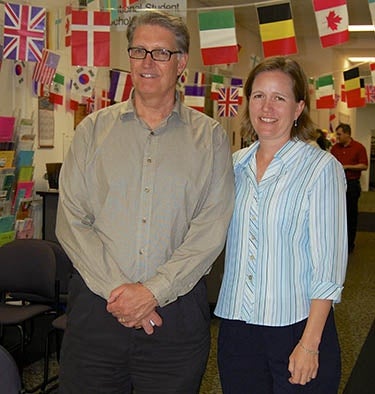
Albrecht characterized Wilcox as both a connector, steadfastly forming networks between people and organizations, and a cultivator, helping others around him develop skills and confidence in the interest of strengthening the entire organization.
“That was Jerry: He would take you with him. He pushed colleagues to step into larger roles so UT was seen as a leader,” Albrecht said. “I gained leadership skills through his urging me to step into challenging situations, which ultimately helped me develop as a professional. He had a really special knack for that.”
Philosophy for the Future
With decades of experience behind him, Wilcox has seen international education evolve dramatically. He offers a word of advice to those entering the field today.
“You need patience,” he said. “My sense is that things have transformed so much, so dramatically since I left in 2008, that the things we used to be able to control and influence may be beyond our reach.”
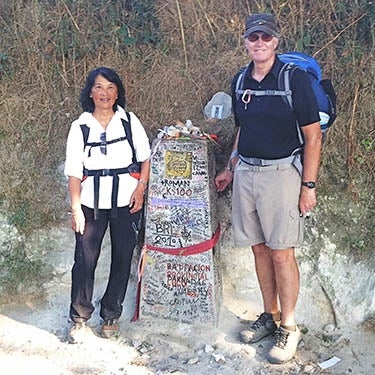
Despite constant geopolitical change, though, Wilcox remains hopeful about the transformative power of global experiences.
“When you move overseas and interact, you see things from people that make you wonder why they do that,” he said. “You do get a different view of life and what’s important.”
Reflecting on his long and dedicated career, Wilcox expressed gratitude for his time at UT Austin and the opportunity to contribute to its international mission.
“We know we’re not out there to do anything except facilitate the magnificent level of international research and exchange that’s going on at UT Austin,” he said. “And I’m really proud when I realize I was able to spend 10 years there.”

